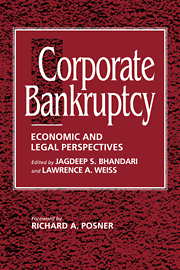Book contents
- Frontmatter
- Contents
- List of tables and figures
- Foreword by the HONORABLE RICHARD A. POSNER
- Preface
- Part I The role of credit
- Part II Bankruptcy as a reflection of the creditors' implicit bargain
- Part III Beyond the basic creditors' bargain
- Part IV Workouts or bargaining in the shadow of bankruptcy
- Part V Alternatives to bankruptcy and the creditors' bargain
- Part VI Experience of other countries
- Index
Part VI - Experience of other countries
Published online by Cambridge University Press: 10 December 2009
- Frontmatter
- Contents
- List of tables and figures
- Foreword by the HONORABLE RICHARD A. POSNER
- Preface
- Part I The role of credit
- Part II Bankruptcy as a reflection of the creditors' implicit bargain
- Part III Beyond the basic creditors' bargain
- Part IV Workouts or bargaining in the shadow of bankruptcy
- Part V Alternatives to bankruptcy and the creditors' bargain
- Part VI Experience of other countries
- Index
Summary
The final chapters of the book examine bankruptcy laws in other countries and provide a comparison to United States law.
The first chapter of this part, Julian Franks' and Walter Torous', "Lessons from a Comparison of U.S. and U.K. Insolvency Codes," favorably compares British to American insolvency law. British law, Franks and Torous observe, better respects creditor priority and thus provides for a less costly transition of control from equity to an insolvent firm's new residual claimants, the creditors.
The next chapter is Michelle White's, "The Costs of Corporate Bankruptcy." White offers a broad comparison among U.S., U.K., French, and German bankruptcy laws and concludes that there is no easy way to identify the best approach. She notes the costs of regimes, such as that in the United States, under which management controls an insolvent firm throughout a reorganization process. These costs are chronicled throughout the chapters in this book. However, White adds, there are other costs to alternative regimes that make bankruptcy less attractive to management. These costs include waste from management's attempt to avoid bankruptcy at any cost. Any cost may be a high cost.
The next chapter, Theodore Eisenberg's and Schoichi Tagashira's, "Should We Abolish Chapter 11? The Evidence from Japan," derives lessons from Japanese insolvency law. Eisenberg and Tagashira note that there are potential efficiency gains from differentiating the treatment of large and small firms in bankruptcy, a differentiation that is often discussed, but that does not now exist, in the United States. For example, Eisenberg and Tagashira argue that auctions may be appropriate only for large firms.
- Type
- Chapter
- Information
- Corporate BankruptcyEconomic and Legal Perspectives, pp. 449Publisher: Cambridge University PressPrint publication year: 1996
- 1
- Cited by



